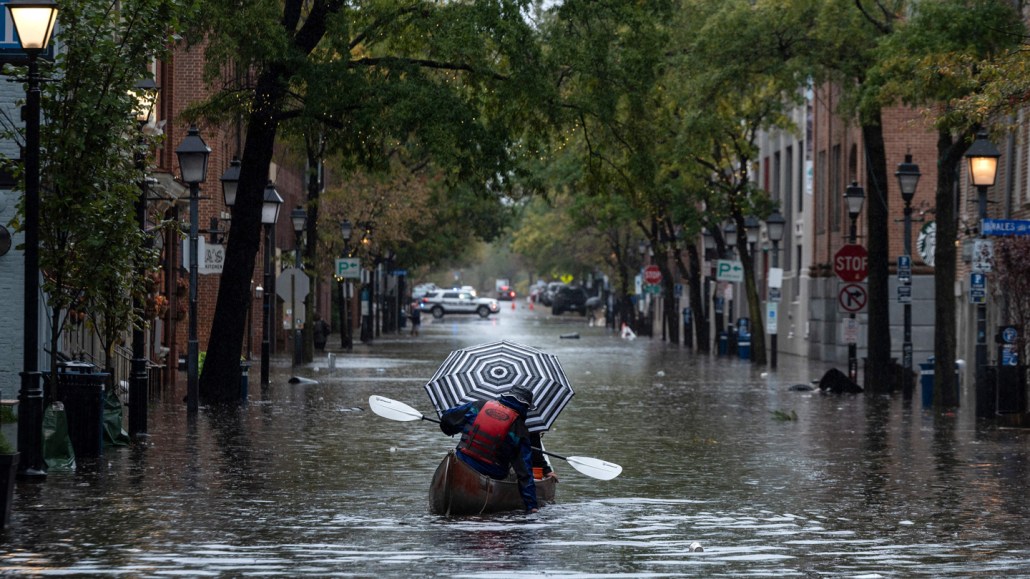
Heavy rains, like those that caused severe flooding in Old Town Alexandria, Va., on October 29, 2021, can disrupt the global economy.
ANDREW CABALLERO-REYNOLDS/AFP/Getty Images Plus
Extremes in rainfall — whether intense drought or flash floods — can catastrophically slow the global economy, researchers report in the Jan. 13 Nature. And those impacts are most felt by wealthy, industrialized nations, the researchers found.
A global analysis showed that episodes of intense drought led to the biggest shocks to economic productivity. But days with intense deluges — such as occurred in July 2021 in Europe — also produced strong shocks to the economic system (SN: 8/23/21). Most surprising, though, was that agricultural economies appeared to be relatively resilient against these types of shocks, says Maximilian Kotz, an environmental economist at the Potsdam Institute for Climate Impact Research in Germany. Instead, two other business sectors — manufacturing and services — were the most hard-hit.
As a result, the nations most affected by rainfall extremes weren’t those that tended to be poorer, with agriculture-dependent societies, but the wealthiest nations, whose economies are tied more heavily to manufacturing and services, such as banking, health care and entertainment.
It’s well established that rising temperatures can take a toll on economic productivity, for example by contributing to days lost at work or doctors’ visits (SN: 11/28/18). Extreme heat also has clear impacts on human behavior (SN: 8/18/21). But what effect climate change–caused shifts in rainfall might have on the global economy hasn’t been so straightforward.
That’s in part because previous studies looking at a possible connection between rainfall and productivity have focused on changes in yearly precipitation, a timeframe that “is just too coarse to really describe what’s actually happening [in] the economy,” Kotz says. Such studies showed that more rain in a given year was basically beneficial, which makes sense in that having more water available is good for agriculture and other human activities, he adds. “But these findings were mainly focused on agriculturally dependent economies and poorer economies.”
In the new study, Kotz and his colleagues looked at three timescales — annual, monthly and daily rainfall — and examined what happened to economic output for time periods in which the rainfall deviated from average historical values. In particular, Kotz says, they introduced two new measures not considered in previous studies: the amount of rainy days that a region gets in a year and extreme daily rainfall. The team then examined these factors across 1,554 regions around the world — which included many subregions within 77 countries — from 1979 to 2019.
The disparity over which regions are hit hardest is “at odds with the conventional wisdom” — and with some previous studies — that agriculture is vulnerable to extreme rainfall, writes Xin-Zhong Liang, an atmospheric scientist at the University of Maryland in College Park, in a commentary in the same issue of Nature. Researchers may need to incorporate other factors in future assessments, such as growth stages of crops, land drainage or irrigation, in order to really understand how these extremes affect agriculture, Liang writes.
“That was definitely surprising for us as well,” Kotz says. Although the study doesn’t specifically try to answer why manufacturing and services were so affected, it makes intuitive sense, he says. Flooding, for example, can damage infrastructure and disrupt transportation, effects that can then propagate along supply chains. “It’s feasible that these things might be most important in manufacturing, where infrastructure is very important, or in the services sectors, where the human experience is very much dictated by these daily aspects of weather and rainfall.”
Including daily and monthly rainfall extremes in this type of analysis was “an important innovation” because it revealed new economic vulnerabilities, says Tamma Carleton, an environmental economist at the University of California, Santa Barbara, who was not involved in the new work. However, Carleton says, “the findings in the paper are not yet conclusive on who is most vulnerable and why, and instead raise many important questions for future research to unpack.”
Extreme rainfall events, including both drought and deluge, will occur more frequently as global temperatures rise, the United Nations’ Intergovernmental Panel on Climate Change noted in August (SN: 8/9/21). The study’s findings, Kotz says, offer yet another stark warning to the industrialized, wealthy world: Human-caused climate change will have “large economic consequences.”






